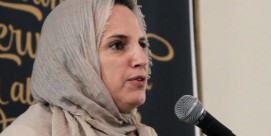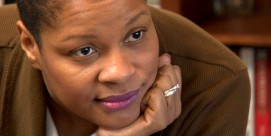Hasidic Women
BOB ABERNETHY: We’re going to take a rare glimpse now into the lives of some Hasidic women in Brooklyn; an 18th-century way of life flourishing in late 20th-century America. Hasidism, Hebrew for both “pious” and “saintly,” began in the late 1700s in Eastern Europe and was brought to the United States during the 1880s. Hasidism is characterized by joyous worship expressed in song and dance, mysticism, and devotion to religious leaders called sadducees or rebbes who drew their disciples around them, establishing family dynasties with a son or son-in-law succeeding his father.
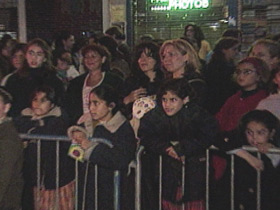
There are numerous Hasidic groups in the U.S., the best known being the Lubavitchers, headquartered in Brooklyn. Their rebbe was the late Menachem Schneerson, who died in 1994, childless, without choosing a successor. The Hasidic way of life, as we’ve said, is strictly defined by religious commandments, in a very particular way for women. Mary Alice Williams paid a visit recently to the Lubavitcher community of Crown Heights, Brooklyn.
MARY ALICE WILLIAMS: What you are watching is a celebration of the Jewish holiday of Sukkoth and of a ritualistic way of life that may appear to outsiders more misogynistic than mysterious. The men dance; the women can only watch, walled apart by a mechitza, a barrier that is as rigid psychologically as it is physically.
They are Chabad Lubavitchers, a sect of the ultra-Orthodox Hasidim, the most conservative branch of Judiasm today. Their entire lives are circumscribed by Kol Isha, the law for gender separation they believe God himself designed.
Ms. SARAH KANEVSKY: We have the laws that we have to be separate. The underlying thing of Judaism is that because God said something, that’s how we do it.
WILLIAMS: Women are constricted by a list of “thou shalt nots.” They may not read sacred texts from the pulpit or even sit with their sons in synagogue. They may not sing or dance or pray or even shop in the presence of men. They must conceal their bodies in long clothing and their hair with wigs and wraps, all for fear their sexual energy could arouse men. It may sound sexist, but the women accept all this without complaint.
Ms. RUTI COHEN: You look at it as a limitation. We look at it as a privilege doing it. You know? Doing what God says.
WILLIAMS: The women around Sarah Kanevsky’s table say knowing your place and staying in it gives them real power. These women run the family, have full discretion over finances, have sole authority over their children.
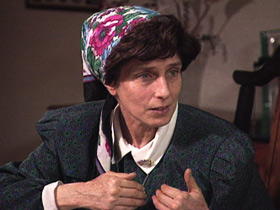
Ms. CHAVIE COHEN: There’s kind of a close power; that the woman without the man is not incomplete and so the man without the woman is incomplete. We need them, they need us to build a complete whole. Actually, the husband and the wife are two halves of one soul. And when they marry, they’re completing the completeness.
Ms. BASHA OKA: Well, in Judaism, the relationship between men and women is a highly charged relationship. I mean, the whole point of Judaism is to sensitize yourself to life in all of its manifestations. And one of those manifestations is men and women.
We do function in different worlds, we really do. I mean, women speak to women and socialize with women. And men speak to men and socialize with men. And they’re very different spheres, they really are. And it’s — for some reason or other, it’s very, very comfortable. It’s very comfortable this way and it works.
Ms. KANEVSKY: I feel fulfilled. You wake up in the morning and you have a purpose and you don’t feel like, “I have to search …”
Ms. R. COHEN: But …
Ms. KANEVSKY: “… for something.” You have a meaning in life.
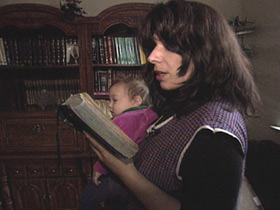
WILLIAMS: What gives meaning to Hasidic rituals is its underlying mystical faith, a belief that each and every deed they do gives them a divine spark, not only bringing them closer to God but making them like God. The deeds are called mitzvah, commandments, but also connections to God. There are an astonishing 613 mitzvah, but for women, the most important are centered on home and family.
Ms. KANEVSKY: Get up. It’s morning.
Unidentified Child: (Foreign language spoken)
Ms. KANEVSKY: This is what the Torah is. We should teach our children. This is the foundation of life, how they get up in the morning and they say (foreign language spoken), “Thank you God for returning my soul.” The first thing they do in the morning is remember God.
WILLIAMS: From the ritual hand washing to daily prayer, davening, Sarah performs her mitzvah. It is her obligation to bring light into the home by lighting the Sabbath candles. She must keep kosher with multiple sets of china for dairy, for meat. She produces meals in volume prior to chavas, during which she cannot cook, and her baking is a commandment and a blessing.
Her mitzvah extends even to her most intimate life. During her menstrual period and for seven days after, she may have no contact with her own husband in her own home in the belief she is touma, which roughly translates to “impure.”

Syvia Jacobson says it’s a bad translation.
Ms. SYVIA JACOBSON: People say, “Oh, it’s dirty. Women are dirty when they have their menstrual cycle.” Totally the opposite is true. What happens? Why does a women have a menstrual cycle? Because it was a potential for life and it didn’t happen, so it leaves her body. So this is a moment that we look at in awe of something that could have been life and isn’t.
WILLIAMS: After 12 days of abstinence, Sarah goes to the mikvah. There she cleanses every square inch of herself, her nails, her hair, her skin, so that in her nakedness, her body is as pure and unblemished as it was at her birth. Then, whispering prayers, she totally immerses herself in a ritual bath, kissed by rain waters Hasidim believe come from Eden itself, in which she’s purified, body and soul, much as the ancient high priests immerse themselves before entering the temple. It symbolizes a change of status and prepares her for the holiness of procreation.
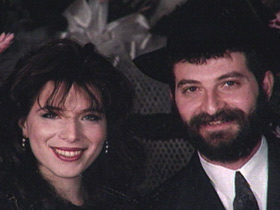
Ms. KANEVSKY: Personally, I feel like the purity laws just enrich my life and bring more excitement and attraction between me and my husband because, you know, like if you have something all the time, you know, then you don’t appreciate it truly. And this way, I have the laws telling me you can’t be together all the time, and then you want each other. And it keeps your marriage excited all the time.
Ms. R. COHEN: That’s what human being is different from an animal. He can hold himself. He can control his desires and his, you know, tendency.
WILLIAMS: The ultra-Orthodox see their way of life as a powerful corrective to the flabby morality they see in the world around them. The world may see them as anachronistic. But Sarah and Ruti celebrate it as an unbroken chain linking them to the biblical women for whom they’re named. They say they are enriched by their faith and fulfilled by their family roles and have no desire to change. I’m Mary Alice Williams in New York.

